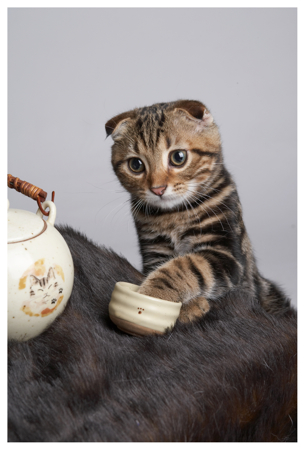
根據線上發表於5月2日、即將登載於6月號小兒科期刊「Infant Feeding Practices Study II」這項研究的結果,許多1歲以下嬰兒也使用植物性補充品和茶飲。
Many infants younger than 1 year receive herbal supplements and teas, according to results from the Infant Feeding Practices Study II reported online May 2 and to be published in the June print issue of Pediatrics.
"Use of dietary botanical supplements (DBS) and herbal teas by infants is a concern for several reasons," write Yuanting Zhang, PhD, from the Office of Regulations, Policy and Social Sciences, Center for Food Safety and Applied Nutrition, Food and Drug Administration in College Park, Maryland, and colleagues. "Because the purity and potency of such supplements and teas are not regulated in the same way as pharmaceuticals, their administration concomitantly with medicines may cause drug interactions, and they may contain heavy metals or other contaminants. Infants may be more susceptible to adverse effects because of differences in physiology, metabolism, and dose per body weight."
The goals of the study were to evaluate the use of dietary botanical supplements and teas among infants, the characteristics of mothers who give these products to their infants, the specific products used, reasons for use, and sources of information.
Between 2005 and 2007, the US Food and Drug Administration (FDA) and the Centers for Disease Control and Prevention conducted a longitudinal survey of women studied from late pregnancy through their infant's first year of life. Study participants were 2653 healthy mothers with healthy term or near-term singleton infants drawn from a nationally distributed consumer opinion panel.
In the first year of life, 9% of infants, including infants as young as 1 month, received dietary botanical supplements or teas. Many of these were marketed and sold specifically for infants, but they had not been evaluated by the FDA to treat, cure, or prevent any disease. A multivariate model showed that factors significantly associated with giving infants dietary botanical supplements or teas were maternal herbal use (P < .0001), longer breast-feeding (P < .0001), and Hispanic ethnicity (P = .016).
Information sources commonly mentioned by the mothers were friends or family, health professionals, and the media. Mothers used dietary botanical supplements or teas to help their infants with fussiness, digestion, colic, and relaxation.
Limitations of this study include use of a sampling frame that was not nationally representative, with limited generalizability because of overrepresentation of non-Hispanic white, older mothers of higher socioeconomic status. In addition, information is lacking on doses or the amount of the supplement or tea given to the infant.
"A substantial proportion of infants in this sample was given a wide variety of supplements and teas," the study authors write. "Because some supplements given to infants may pose health risks, health care providers need to recognize that infants under their care may be receiving supplements or teas."
The study authors have disclosed no relevant financial relationships.
中文翻譯在這邊:
美國食品藥物管理局食品安全與應用營養中心、政策與社會科學管理辦公室Yuanting Zhang博士等人寫道,基於一些原因,嬰兒使用飲食植物性補充品(DBS)和藥草茶有其顧慮,因為這類補充品和茶飲的純度及強度並未以製藥方式管理,因此可能會和其他藥物產生交互作用,也可能含有重金屬或其他污染物,還可能因為嬰兒生理、代謝與劑量上的差異使嬰兒產生副作用。
這篇研究的目標是評估嬰兒使用飲食植物性補充品和茶飲的情況、讓嬰兒使用這些產品之母親的特點、使用的特定產品、使用的原因和資訊來源等。
2005至2007年間,FDA和疾病管制中心進行了一項婦女縱向調查,從她們懷孕後期到嬰兒週歲之間,研究對象是來自一個遍佈全國的消費者意見調查系統的2,653名健康孕婦、懷有足月或即將足月單胞胎。
在週歲前,9%的嬰兒、包括僅1個月大者,曾接受飲食植物性補充品或茶飲,這些產品有許多是以嬰兒為對象進行銷售,但是它們未曾接受FDA評估對任何疾病的治療或預防效益;多變項模式顯示,與給予嬰兒飲食植物性補充品或茶飲顯著有關的因素是:母親使用藥草(P < .0001)、哺母乳期間較長(P < .0001)以及西班牙裔(P = .016)。
媽媽們提到的資訊來源主要是家人或朋友、健康專業人士與媒體,母親使用飲食植物補充品或茶飲幫助嬰兒的躁動、消化、腹絞痛和放鬆等。
研究限制包括,使用的樣本時間點不具全國代表性,因為主要是非西班牙裔白人而無法一般化、媽媽是年紀較大的高社經地位者,此外,也缺乏嬰兒使用之補充品或茶飲劑量與數量的資訊。
研究作者寫道,這個樣本中,真正有部分嬰兒被給予各種補充品和茶飲,因為給予嬰兒的這些補充品可能有的有健康風險,健康照護提供者必須確認所照護的嬰兒是否有接受補充品或飲品。
資料來源:http://www.24drs.com/professional/list/content.asp?x_idno=6514&x_classno=0&x_chkdelpoint=Y





 留言列表
留言列表
 線上藥物查詢
線上藥物查詢 